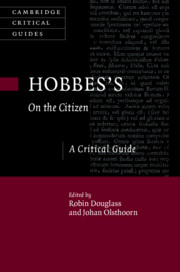Book contents
- Hobbes’s On the Citizen
- Cambridge Critical Guides
- Hobbes’s On the Citizen
- Copyright page
- Contents
- Contributors
- Acknowledgments
- Abbreviations
- Introduction
- Chapter 1 Excavating On the Citizen
- Chapter 2 Hobbes and Aristotle on the Foundation of Political Science
- Chapter 3 All the Mind’s Pleasure: Glory, Self-Admiration, and Moral Motivation in On the Citizen and Leviathan
- Chapter 4 The Right of Nature and Political Disobedience: Hobbes’s Puzzling Thought Experiment
- Chapter 5 Motivation, Reason, and the Good in On the Citizen
- Chapter 6 Property and Despotic Sovereignty
- Chapter 7 Sovereignty and Dominium: The Foundations of Hobbesian Statehood
- Chapter 8 Corporate Persons without Authorization
- Chapter 9 Hobbes on Love and Fear of God
- Chapter 10 “A Rhapsody of Heresies”: The Scriptural Politics of On the Citizen
- Chapter 11 On the Citizen and Church-State Relations
- Chapter 12 Sovereign-Making and Biblical Covenants in On the Citizen
- Bibliography
- Index
- Cambridge Critical Guides
Chapter 2 - Hobbes and Aristotle on the Foundation of Political Science
Published online by Cambridge University Press: 15 November 2019
- Hobbes’s On the Citizen
- Cambridge Critical Guides
- Hobbes’s On the Citizen
- Copyright page
- Contents
- Contributors
- Acknowledgments
- Abbreviations
- Introduction
- Chapter 1 Excavating On the Citizen
- Chapter 2 Hobbes and Aristotle on the Foundation of Political Science
- Chapter 3 All the Mind’s Pleasure: Glory, Self-Admiration, and Moral Motivation in On the Citizen and Leviathan
- Chapter 4 The Right of Nature and Political Disobedience: Hobbes’s Puzzling Thought Experiment
- Chapter 5 Motivation, Reason, and the Good in On the Citizen
- Chapter 6 Property and Despotic Sovereignty
- Chapter 7 Sovereignty and Dominium: The Foundations of Hobbesian Statehood
- Chapter 8 Corporate Persons without Authorization
- Chapter 9 Hobbes on Love and Fear of God
- Chapter 10 “A Rhapsody of Heresies”: The Scriptural Politics of On the Citizen
- Chapter 11 On the Citizen and Church-State Relations
- Chapter 12 Sovereign-Making and Biblical Covenants in On the Citizen
- Bibliography
- Index
- Cambridge Critical Guides
Summary
Thomas Hobbes claims that he set political philosophy on its proper footing for the first time in On the Citizen. We examine the opening argument (1.1-1.2), in which Hobbes seeks to remove and replace the longstanding Aristotelian foundation, that human beings are political animals. Hobbes associates this idea with the view that human society is made possible by “mutual love” and a desire for association for its own sake. We argue that Hobbes is particularly targeting the Nicomachean Ethics on philia (friendship or love) and its role in the polis. One might nonetheless doubt that Hobbes’s arguments were at all successful. Although Hobbes certainly takes pleasure in portraying Aristotle’s views in a maximally absurd light, we show that Hobbes’s argument is more sophisticated than it first appears, and that it brings out genuine difficulties for Aristotle’s view. Finally, we consider Hobbes’s revisitation of the idea of “political animals” in a later section of On the Citizen. What emerges from this discussion is that Hobbes’s disagreement with Aristotle does not only – perhaps, not primarily – concern the nature of human motivation, but rather the essence of politics. The idea of a naturally political animal turns out to be an oxymoron.
Keywords
- Type
- Chapter
- Information
- Hobbes's On the CitizenA Critical Guide, pp. 31 - 50Publisher: Cambridge University PressPrint publication year: 2019
- 4
- Cited by

